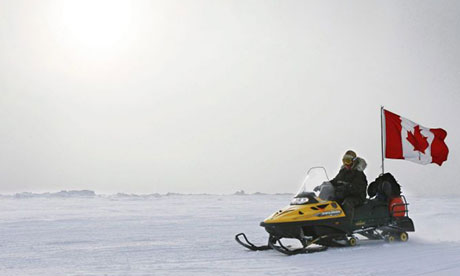Canada to include the North Pole in its claim for Arctic territory, resources
Published time: December 10, 2013 00:27

Canadian Foreign Affairs Minister John Baird and Arctic Council chair Leona Aglukkaq officially announced Monday Canada’s claim to the extended continental shelf in the Arctic. It was reported by The Globe and Mail last week that Prime Minister Stephen Harper requested a government board charged with assessing Canada’s claims beyond its territorial waterways, per United Nations rules, to seek a more expansive stake of Arctic area to include the North Pole.
"We have asked our officials and scientists to do additional work and necessary work to ensure that a submission for the full extent of the continental shelf in the Arctic includes Canada's claim to the North Pole," Baird said during a press conference at the House of Commons.
Pursuant to its status as a signatory to the UN Convention on the Law of the Sea, Canada submitted Friday only a partial application to the UN Commission on the Limits of the Continental Shelf showing scientific evidence that it should be able to assert its privileges over territory and resources - namely oil and gas rights - within waterways well beyond its borders. Under the Convention, a nation can claim up to 200 nautical miles of seabed beyond its territorial markers. A country can demand 350 nautical miles if it can prove a natural extension of its land area. The UN requires comprehensive mapping evidence to justify any declaration of rights.
The preliminary application outlines complete scientific evidence regarding Canada’s Atlantic Ocean requests and a portion of its Arctic claim all while reserving the nation’s right to make further submissions at a later date.
Canada’s application was due based on UN requirements that a country that has ratified the Convention make its claim within ten years. Canada ratified the UN Convention in 2003.
The North Pole is 817 kilometers north of Canada’s - and the world’s - northernmost settlement, Alert, Nunavut. The town is home to a Canadian Forces station and Environment Canada station.
"Fundamentally, we are drawing the last lines of Canada. We are defending our sovereignty," Aglukkaq said, according to CBC News.
Resources bring competition
Canada has spent nearly US$200 million on the scientific-discovery process of the area, including dozens of icebreaker and helicopter trips for teams of scientists. An unmanned submarine was used to collect data below the frigid Arctic water. The United States, which is also expected to claim further seabed territory, aided Canada in the research phase, though the US has not ratified the UN Convention yet."If the US doesn't ratify, then we don't know what happens if there's a dispute," Rob Huebert, associate director of the Center for Military and Strategic Studies at the University of Calgary, told The Verge. "What do you do about a contested area with the US if there isn't an agreement that governs how that dispute is resolved?"

"It's a dangerous and difficult region to drill, but the idea of profits seem to exceed those risks for governments," Huebert said of the volatile Arctic. "We're not seeing anyone pull away."
Read More Here
.....
Canada to claim north pole as its own
UN submission will seek to redefine Canada's continental shelf to capture more Arctic oil and gas resources

A Canadian ranger
making a patrol on Ellesmere Island, part of the country's existing
Arctic territories. Photograph: Jess Mcintosh/AP
John Baird said the government had asked scientists to work on a future submission to the United Nations arguing that the outer limits of the country's continental shelf include the pole, which so far has been claimed by no one.
Canada last week applied to extend its seabed claims in the Atlantic Ocean, including some preliminary Arctic claims, but wants more time to prepare a claim that would include the pole.
Asserting Canada's rights in the Arctic has been a popular domestic issue for the prime minister, Stephen Harper, though at least one expert on the issue has described the planned claim as a long shot.
Baird said: "We are determined to ensure that all Canadians benefit from the tremendous resources that are to be found in Canada's far north."
Countries including the US and Russia are increasingly looking to the Arctic as a source of natural resources and shipping lanes. The US Geological Survey says the region contains 30% of the world's undiscovered natural gas and 15% of oil. If Canada's claim is accepted by the UN commission it would dramatically grow its share.
Read More Here
.....








No comments:
Post a Comment
Hello and thank you for visiting my blog. Please share your thoughts and leave a comment :)